A Private War review - Rosamund Pike burns with passion in well-meaning biopic
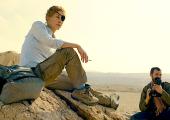
A risk-loving journalist is remembered via a safe-seeming film
The Sunday Times war correspondent Marie Colvin lived such a fearless life that it's a shame this celluloid biopic isn't correspondingly brave.
theartsdesk Q&A: Matthew Heineman on directing 'A Private War'
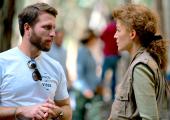
Getting inside the mind of Sunday Times reporter Marie Colvin
The release of Matthew Heineman’s film A Private War, about the tumultuous life and 2012 death of renowned Sunday Times war correspondent Marie Colvin, has gained an added edge of newsworthiness from this week’s verdict by Washington DC’s US District Court for the District of Columbia.
DVD: A Moment in the Reeds

Intimate gay-themed Finnish indie drama muses on what it means to belong
Mikko Makela’s debut feature is as sheerly concentrated a piece of filmmaking as you can imagine. The Finnish director – previously better known as an actor – manages his principle cast of three immaculately as they play out a powerful drama that takes in family relationships, sexuality and the immigrant experience, and the sense of belonging (or not) that the last two issues generate.
There’s another strong presence here, too, namely the lakeside location in which, as its title hints, A Moment in the Reeds is set; it has the kind of isolated, back-to-nature beauty that is so appealing on long summer days (and would be unimaginable in winter). The film's loose story revolves around the renovation of a summerhouse that Juoko (Mikka Melender) is preparing to sell; his son Leevi (Janne Puustinen) has come home from his graduate studies in Paris to help, though his efforts are distracted and half-hearted. Leevi's slight blond beauty somehow accentuates his callowness and a sense that he has lost his connection with the place, while his conflicted (if largely unspoken) interaction with his father revolves around his homosexuality and his dead mother, whose relationship with Juoko had clearly been strained.
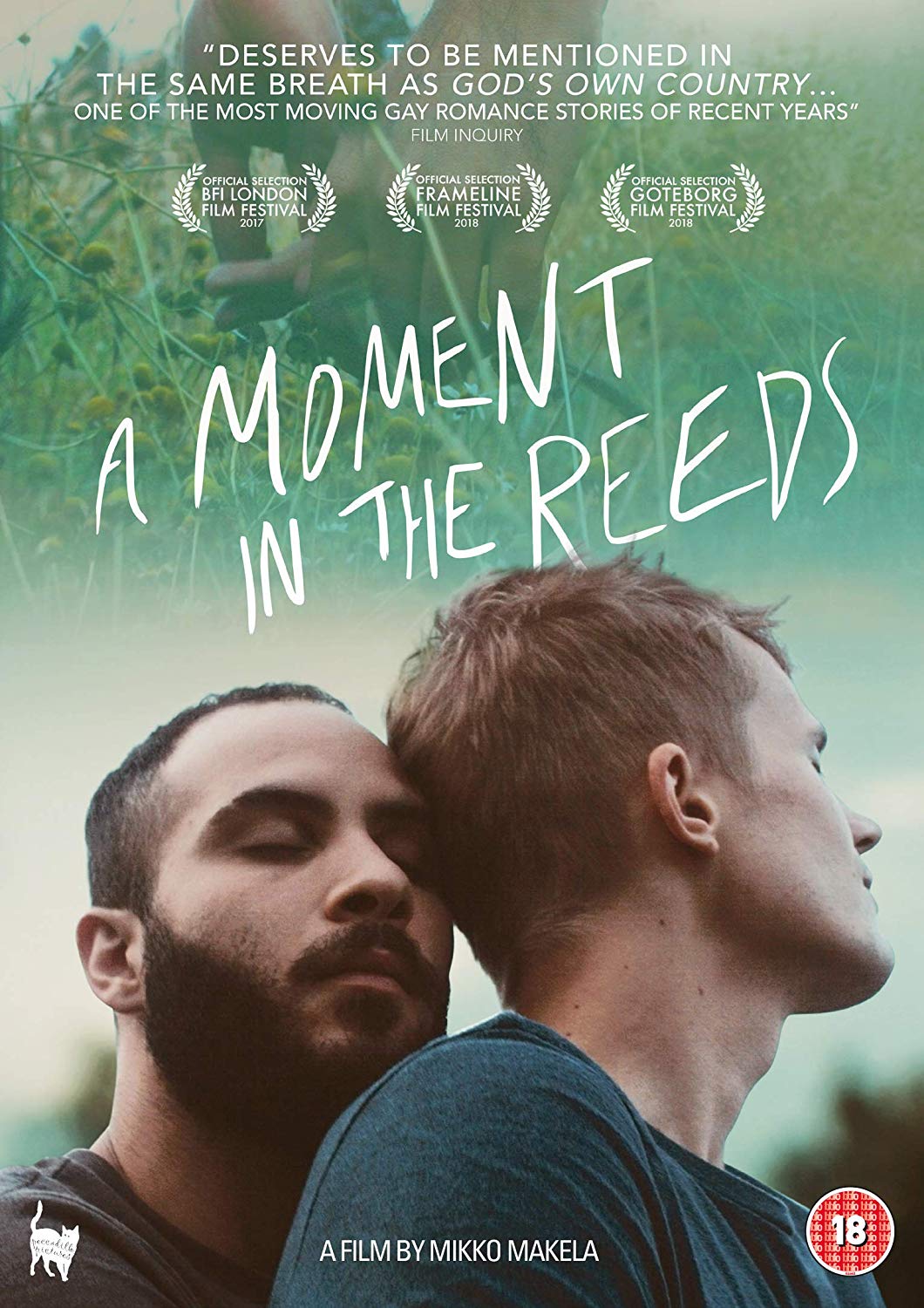 The fact that Leevi is gay is clearly no secret, but it remains a subject best avoided: indeed, what connection can there really be between this son, who is writing a thesis on “gender performativity”, and his gruff father who has probably never travelled far from the place of his birth and retains the prejudices of an older world? Sensing that his son may not prove much of a help with the renovation, Juoko has hired a handyman from an agency, and there’s considerable, if uneasy comedy when Tareq (Boodi Kabbani) turns up. A refugee from Syria who has claimed asylum, he is taking odd jobs until his command of the language allows him to continue in his profession as an architect (such skills only help with the task in hand).
The fact that Leevi is gay is clearly no secret, but it remains a subject best avoided: indeed, what connection can there really be between this son, who is writing a thesis on “gender performativity”, and his gruff father who has probably never travelled far from the place of his birth and retains the prejudices of an older world? Sensing that his son may not prove much of a help with the renovation, Juoko has hired a handyman from an agency, and there’s considerable, if uneasy comedy when Tareq (Boodi Kabbani) turns up. A refugee from Syria who has claimed asylum, he is taking odd jobs until his command of the language allows him to continue in his profession as an architect (such skills only help with the task in hand).
That lack of linguistic connection means that Leevi has to act as translator, while he clear also enjoys his father’s discomfort at the fact that so obvious an outsider has turned up. It’s not that Juoko is hostile – in fact, his efforts to communicate in broken English seem friendly enough – rather that the unfamiliar disconcerts him; Leevi, meanwhile, is casual about the third man’s presence, not least because the latter is clearly more concerned with his work. It’s only when the older man is called away urgently and the two are left alone, that an unhurried closeness develops, as the Finn recalls earlier times he had spent in the place; later, their work finished for the day, the two unwind in the sauna.
Then, as they relax over beers in the gloaming, a sense of deeper connection arises, not least over anomalous shared details (both, in their very different ways, are effectively evading military service). Then, over a locking of glances, the acknowledgement of mutual attraction reveals itself, and a new closeness, one of wordless contact, sets in: as they gradually open up to one another, the two actors play their physical contact with real intimacy. Although the father reappears periodically, they are rather left to their own devices, and Makela captures beautifully their easy connection in some moody slow motion shots over landscapes.
We suspect that Makela’s original script was spare, its bones fleshed out through improvisation
It’s a film in which the principle of “less is more”, dictated at least in part, one assumes, by budgetary considerations, works beautifully. There’s barely any music – some does appear, but only well after the hour mark – though the soundtrack is rich in its sense of nature, bird song especially. Iikka Salminen’s often hand-held cinematography has a special eyes for faces, as well as compounding the sense of surrounding silence: his camera catches the nuances of emotion beautifully. A closing credit notes “additional dialogue by the cast”, and we suspect that Makela’s original script was spare, its bones fleshed out by its actors through improvisation over considerable and rewarding rehearsal.
A Moment in the Reeds has earned comparison with British director Francis Lee’s God’s Own Country, not least for its study of a gay relationship developing in rural isolation between outsider protagonists from very different worlds. Though both films excel in the closeness of their initially unlikely romances, Makela’s is notably different, not least in its giving voice to the refugee immigrant experience, as Kabbani’s character reveals something of what he went through in his crossing of Europe to reach this new country that he is now determined to make his home. (Kabanni, an openly gay Syrian actor, is himself an immigrant to Finland.)
Most of all, the Finnish film has a greater sadness, with its sense that, even when two outsiders come together, the chances of achieving happiness remain so fragile. Makela has delivered a truly sensitive piece of filmmaking – with his style already finely formed, it will be fascinating to see what he turns to next.
Overleaf: watch the trailer for A Moment in the Reeds
Under the Wire review - risking everything to tell the world the truth
A brave woman died for believing she could make a difference
She was “the most important war correspondent of her generation”, says Sean Ryan, her editor at The Sunday Times. And her colleague Paul Conroy describes her as “a complete and utter one-off – exceptionally driven, with a real sense of purpose”. These tributes are for Marie Colvin, who was killed by President Assad’s forces on February 22 2012.
Conroy was on assignment with her when she died. He was badly wounded in the attack, but escaped from Syria to write the book which forms the basis for Under the Wire. Speaking directly to camera, he tells the gripping story of their illegal entry into the country to cover the siege of Homs. His account of events over the following days is so vivid that you feel as if you were there with him, experiencing all the excitement, fear, noise and confusion.
She felt she had betrayed the people of Homs by agreeing to leave
Most foreign correspondents considered the war in Syria too dangerous to cover; but Colvin and Conroy (main picture) had other ideas. Denied a visa, they smuggled themselves over the border from Lebanon. “Being a war correspondent is about what people are going through,” Colvin had said, and she was determined to report on the carnage being wreaked on the hapless civilians trapped in Homs by the Syrian army.
Director Chris Martin has recreated their perilous journey from Beirut. After several nights of “being passed from one shadow to another”, it ended with a hike through a mile-long storm drain. This was the only way into Baba Amr, a poor suburb of Homs where 28,000 civilians were being subjected to constant bombardment. “It wasn’t war, it was slaughter,” recalls Conroy. “It was impossible to go out in the street because it was raining shells and missiles. And Assad’s snipers were on all the tall buildings.”
They managed to visit “the Widow’s Basement”, a dank cellar where dozens of women and children had taken refuge from the bombs. We see Colvin interviewing them for an article that featured with Conroy’s photographs on the front page of The Sunday Times on February 19. By then the journalists had already left – forced to go by rumours that a ground offensive was imminent. When the rumour proved false, Colvin was distraught. She felt she had betrayed the people of Homs by agreeing to leave (pictured below: Colvin taking notes in a bombed house in Homs).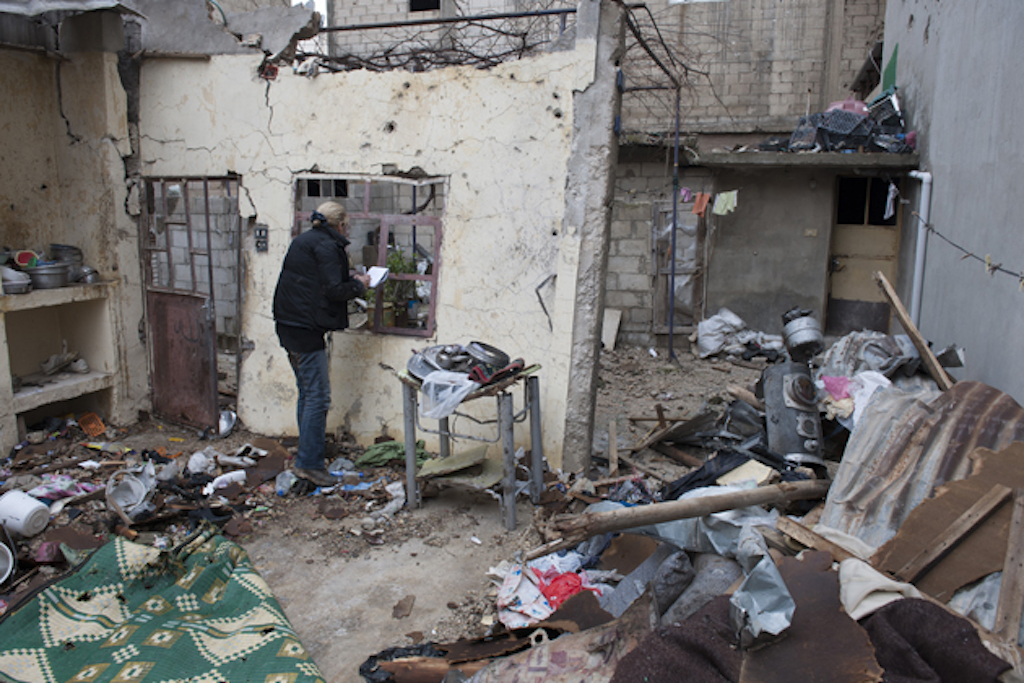 Flashback to 1999 in East Timor, where foreign correspondents were advised to quit a UN compound, when it was surrounded by murderous militiamen. Colvin refused to go and her presence deterred the attack long enough for the 1,000 refugees inside to be rescued. Afterwards she summed up what she learned from the experience: “I thought that journalism can make a difference. It is not in vain.”
Flashback to 1999 in East Timor, where foreign correspondents were advised to quit a UN compound, when it was surrounded by murderous militiamen. Colvin refused to go and her presence deterred the attack long enough for the 1,000 refugees inside to be rescued. Afterwards she summed up what she learned from the experience: “I thought that journalism can make a difference. It is not in vain.”
She had a reputation for falling out with colleagues who were less driven than herself and so were reluctant to take as many risks. Even the loss of an eye from shrapnel in Sri Lanka failed to dampen her sense of purpose. She simply covered the socket with an eyepatch and carried on, wearing it like a badge of honour. And for parties, she sported a black patch decorated with rhinestones. One photographer described her as “scarier than the war they were covering”. But Conroy was a former soldier, used to combat, and during a stint in Libya reporting on the Siege of Misrata in 2011, the pair formed a deep bond of mutual respect.
Without an exit stratagem, their chances of escaping the hell hole were not good
Unknown to their editor, they decided to return to Homs, even though Conroy had “a bad feeling” about the possible outcome. He was right, of course. Without an exit stratagem, their chances of escaping the hell hole were not good especially as, according to Conroy, conditions there were “the worst we’d ever seen”.
Back in Baba Amr, we see them at a makeshift medical centre where Dr Mohammed “works miracles” without any drugs or anaesthetic. He can only watch helplessly, though, as a baby dies from shrapnel wounds. ‘I felt rage,” recalls Conroy, “and I knew that, for Marie, this was her story and she was going to go for it whatever the cost. She decided to do as many broadcasts as possible as a plea to the world.” In that final broadcast the newscaster asks her: “Why is it important to see these images... Why is it important for you to be there?” She replies: “I feel very strongly that they should be shown. That’s the reality. That little baby probably will move more people to think ‘Why is no-one stopping this murder that is happening every day?’ Every civilian house on this street has been hit. There are no military targets here... the Syrian army is simply shelling a city of cold, starving civilians.”
The next day the shelling resumed at 5am; the building where the journalists were staying was hit. Colvin and French photographer Rémi Ochlik were both killed and the French correspondent Edith Bouvier was badly wounded. As he watches the footage, Conroy murmurs: “May God bless your soul, dear Marie. My life will never be the same again.” 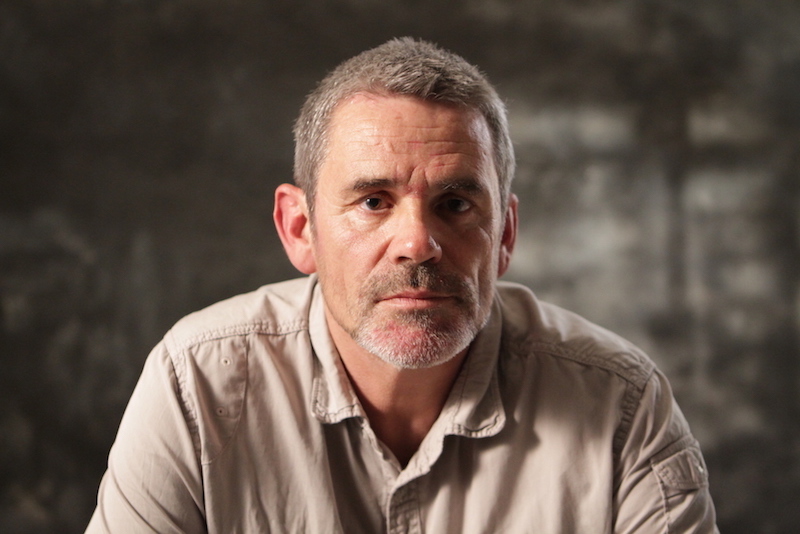
On the fourth night, a convoy of cars took them on a mad dash through deserted streets to the storm drain. They came under heavy fire and 20 Syrians were killed helping their escape. A motorbike drove Conroy along the tunnel to a wall of mud that blocked the way. “Tell the world,” said the biker as he shoved him towards a small opening at the top. Dragging himself up, Conroy got impaled on a metal spike. “I thought I was going to die, but I had Marie on my shoulder and the people of Baba Amr who sacrificed everything to get me to that point. So I just ripped the staples out and all the flesh and muscle, and fell into a pool of water and some guys carried me on a piece of plastic to the end of the tunnel.”
Next he had to crawl across a field to a waiting van. “It was snatching life from the jaws of death,” he recalls. “That’s where my life began again, in the back of that van. I wanted to tell Marie’s and Rémi’s story. And those beautiful people who were being slaughtered, I wanted to tell their story. To this very day I carry the weight and responsibility of what I promised. And I’m still doing it; its never going to stop.”
One of the most moving moments of this dramatic documentary is watching Conroy’s reaction as he sees, for the first time, a film on YouTube of the residents of Homs braving the bullets to demonstrate their thanks to the fallen journalists. Placards reading “We Will Not Forget You” are held high alongside others bearing the names of Marie Colvin and Rémi Ochlik.
The saddest aspect of this story is that Colvin’s determination to tell the world what she had seen cost her her life, yet no-one responded to her plea by coming to the aid of the people of Homs. Her bravery and commitment were in vain. This time journalism did not make a difference.
Overfleaf: watch the trailer for Under the Wire
The Jungle, Playhouse Theatre review - new territory
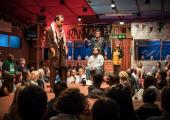
How many deaths would you survive for a second chance?
"I am dead," declares Okot before recounting the horrors he survived to reach Calais. Each time, he says, "I died." How many times can you die before you are truly dead?
City of Ghosts review - chilling but inspiring report on Syria's citizen journalists
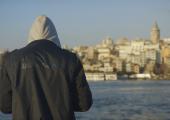
Quietly masterful and harrowing documentary on undercover reportage in Raqqa
Raqqa was once a prosperous if little-known town in northern Syria. Since 2014, however, it has served as the de facto capital of ISIS’s self-styled caliphate, and as such has been physically decimated, its population subjected to increasingly horrific subjugation.
Syria: The World's War, BBC Two review - anatomy of a conflict, brilliantly told
A view from the streets and the chancelleries: Lyse Doucet attempts a perspective on the conflict of our century
This was not a film that left you with much respect for the wisdom of politicians, but perhaps its truest line came from John Kerry, when he called the ongoing – seven years, and counting – Syrian conflict “an insult to the humanity of this planet”.
Civilisations, BBC Two review - no shocks from Schama
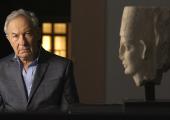
The much-heralded successor to Kenneth Clark's series reveals little new so far
Lord Clark – “of Civilisation”, as he was nicknamed, not necessarily affectionately – presented the 13 episodes of the eponymous series commissioned by David Attenborough for BBC Two in 1969; it was subtitled “A Personal View”, and encompassed only Western Europe (from which even Spain was excluded).
Human Flow review - two hours of human misery
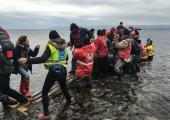
A film that needed to be made, but do we want to heed its message?
Soaring over an expanse of blue sea, a white bird traverses the screen diagonally. Gliding unhindered through the air, it is the embodiment of freedom; by contrast, the movement of people down below is constrained by border crossings and passport controls. The perfect tranquility of this opening shot is the calm before the storm; prepare to spend the next two hours witnessing extremes of human misery and, by turns, feeling horrified, angry and deeply depressed.

